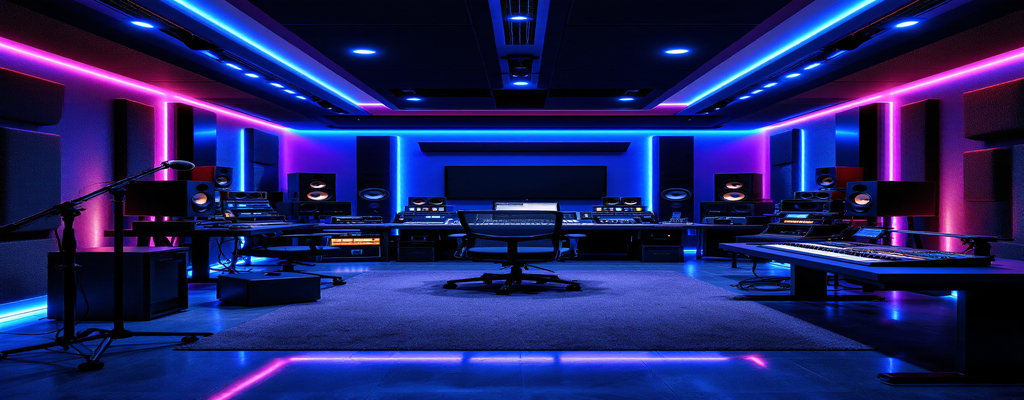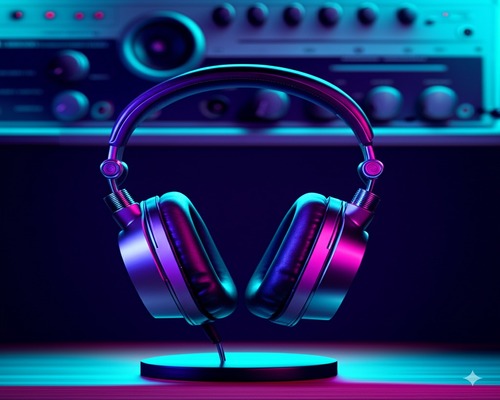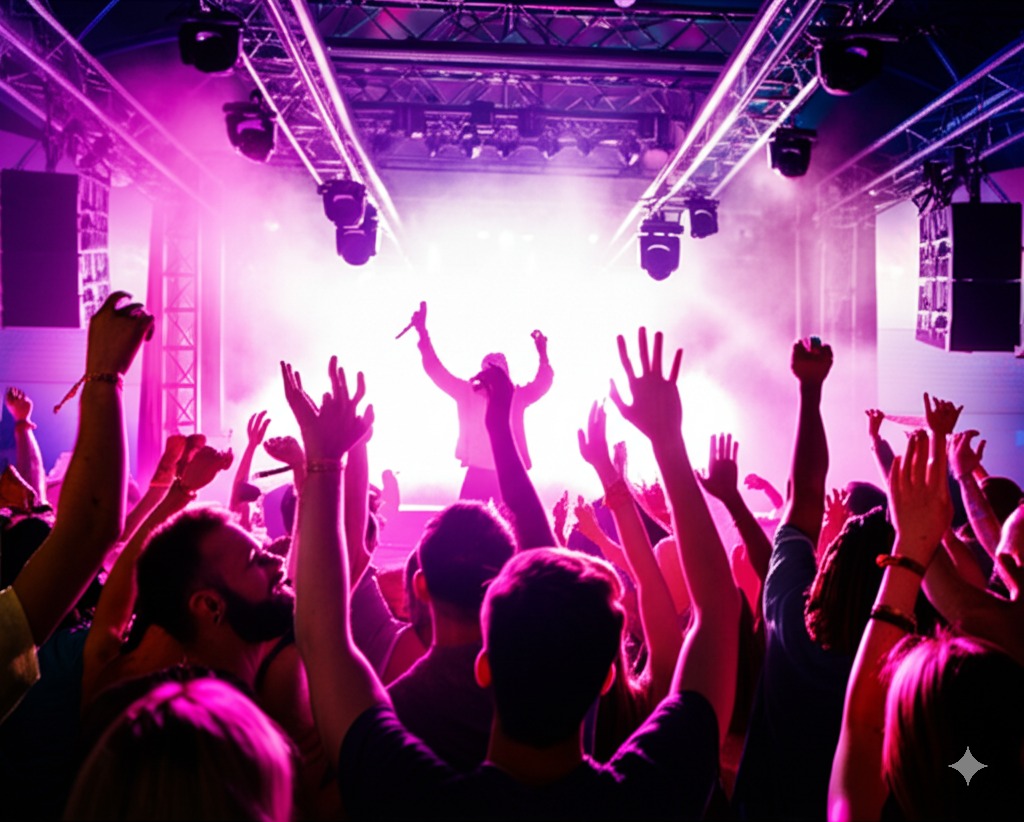
What exactly is AI in pop music? It’s basically smart computer programs that help artists create, produce, and promote songs. These tools can write melodies, generate beats, suggest lyrics, mix tracks, and even predict which songs might become hits. They’re changing how pop music gets made by making the whole process faster, cheaper, and more accessible to everyone.
What’s cool is that AI in pop music is working alongside artists, not replacing them. The human still guides the creative vision while the AI handles technical stuff or offers suggestions. Think of it as having a super-talented assistant who never gets tired and can instantly come up with thousands of ideas.
From Lady Gaga to bedroom producers you’ve never heard of, artificial intelligence music tools are now part of the creative process for all kinds of artists. Let’s dig into how this tech is changing the pop music we hear every day.
Introduction to AI in Pop Music
Pop songs today sound nothing like what was playing just 10 years ago, right? That’s not by accident. Behind the scenes, artificial intelligence music tools are helping artists write, produce, and promote their songs way faster and cheaper than before.
AI in pop music isn’t just some fancy extra feature – it’s becoming something artists pretty much need to keep up. Whether it’s throwing out chord ideas, putting together beats, or making a track sound super clean, AI is now part of the team for tons of hit-makers.
Why does this matter so much? It’s opening doors. The stuff that used to need a fancy million-dollar studio is now available to anyone with a decent laptop and internet. This whole democratization through AI tools for musicians is changing both who gets to make pop music and what it ends up sounding like.
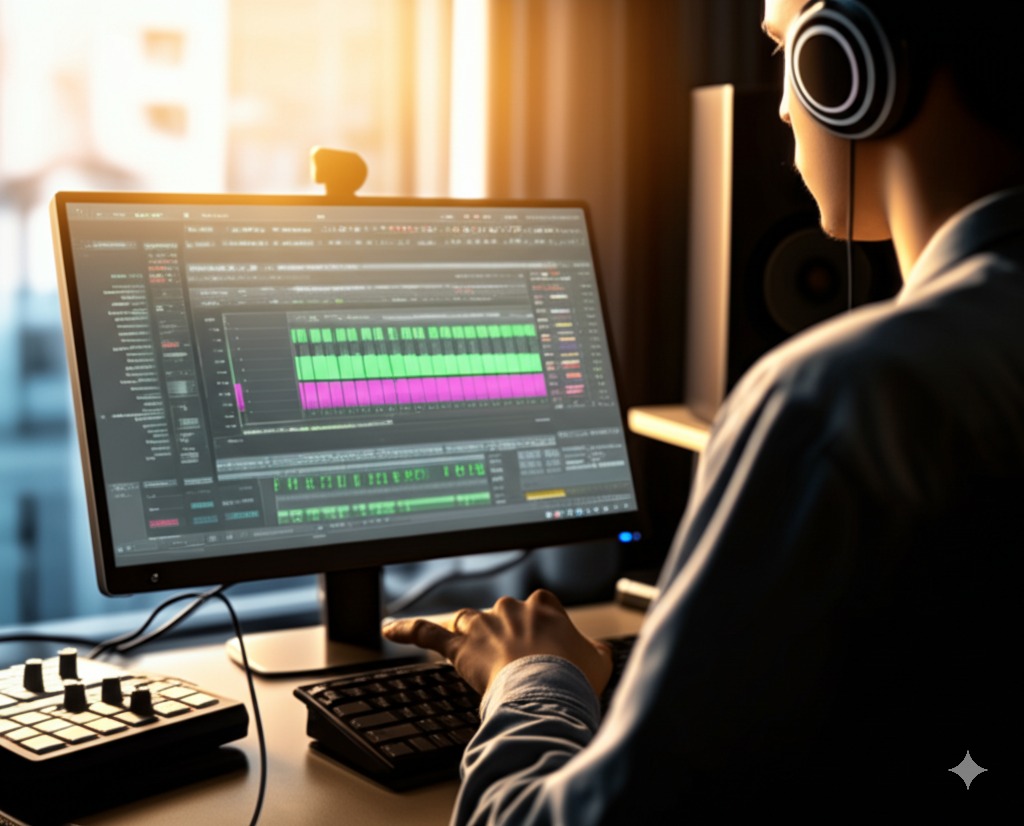
The Evolution of Pop Music Production with AI
From Tape to Tech: How We Got Here
Pop music production has come a long way:
- 1950s-60s: Basic analog recording on tape with limited tracks
- 1970s-80s: Introduction of synthesizers and drum machines
- 1990s-00s: Digital Audio Workstations (DAWs) like Pro Tools take over
- 2010s: Cloud collaboration and software plugins become standard
- 2020s: AI in pop music begins reshaping the entire workflow
The big leap happened around 2016-2018, when the first AI music creation software hit the market. These early tools could generate simple melodies and drum patterns, but they were just the beginning of what would become a production revolution.
Today’s AI in pop music tools can analyze thousands of hit songs to learn what makes them catchy, then apply those patterns to help artists create new material. This shift is comparable to how streaming changed music listening – it’s that fundamental to the creative process.
How Today’s Pop Hits Use AI
Modern pop music production tools often include AI at multiple stages:
- Songwriting assistance suggests chords and melodies
- Beat generators create drum patterns and basslines
- Vocal processing tools can tune, harmonize, or even transform voices
- Mixing and mastering AI helps polish the final product
Major artists now regularly use AI music production tech in their workflow, often without fans realizing it. The line between human and AI contribution is getting blurrier with each chart-topping hit.
AI-Assisted Songwriting and Composition
Writing Hits with Algorithms
AI-assisted songwriting is perhaps the most talked-about application of this technology. Here’s how it works:
- AI analyzes patterns from thousands of hit songs
- It learns what chord progressions, melodies, and structures resonate with listeners
- Artists can generate new ideas based on specific genres, moods, or even similar artists
- Humans then select, refine, and build upon the AI suggestions
Tools like OpenAI’s music models, Aiva, and Amper Music can now create surprisingly catchy hooks and melodies. Some can even generate lyrics that match specific themes or emotional tones the artist wants to convey.
The Upside and Downside
The pros of AI in pop music songwriting are clear:
- Beats writer’s block by offering endless new ideas
- Speeds up the creative process
- Suggests combinations humans might not think of
- Makes songwriting accessible to those without traditional music training
But there are valid concerns too:
- Could lead to more formulaic, less innovative music
- Raises questions about authenticity and artistic expression
- May advantage tech-savvy artists over traditional musicians
- Blurs the line of creative ownership
As one producer put it: “AI tools for songwriting and music composition aren’t replacing creativity – they’re just changing where the creative decisions happen.”
AI in Mainstream Music: Beat Making and Arrangement
Building the Sonic Foundation
Beat making and arrangement is where AI music production really shines. Modern AI beat making tools can:
- Generate complete instrumental tracks in seconds
- Create beats in specific styles (trap, dance-pop, etc.)
- Suggest complementary instrument combinations
- Develop entire song structures from verse to chorus to bridge
This technology has already helped craft beats for tracks on the Billboard charts. The impact of AI in music production is particularly apparent in how quickly artists can now test different sonic directions before committing.
Hit Songs With AI DNA
Several recent pop hits have used AI in pop music production:
- Kylie Minogue’s “Padam Padam” used AI to help identify its viral potential before release
- Warner Music’s AI tools predicted the song would perform well based on skip rates and social media metrics
- The company’s analytics spotted the track as a potential sleeper hit three months before it dropped
Source: Ohio University
Another fascinating example is how AI-generated music is creating unique genre blends:
- Platforms like Splice CoSo analyze TikTok trends to create hybrid hooks
- These algorithms reduced idea development time by 70%
- A 2024 Charli XCX track used AI to mix hyperpop with traditional Balkan folk melodies
- This unusual combination helped the song reach #1 on the Eurochart
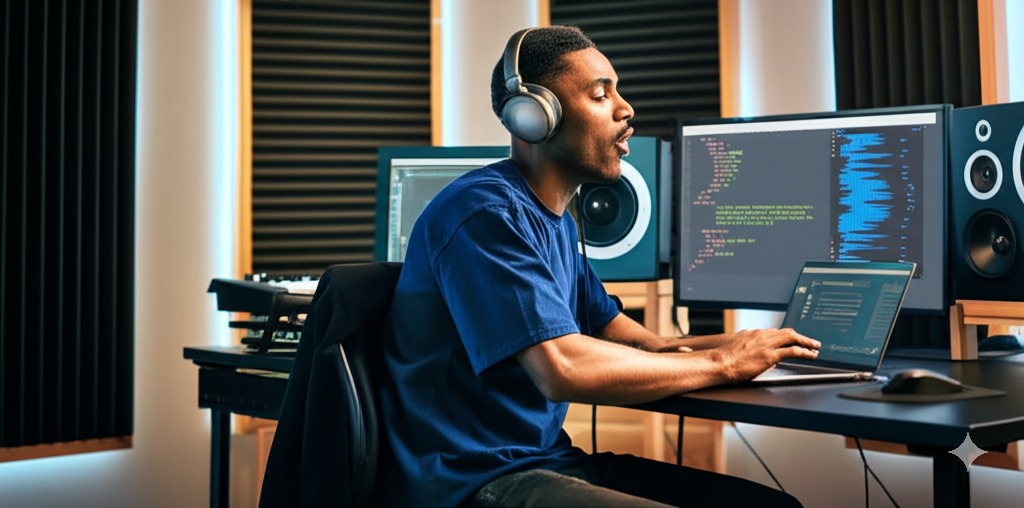
AI in Music Industry Mixing and Mastering
Polishing to Perfection
The final stages of music production with AI involve getting the sound just right:
- AI mixing tools balance levels, EQ, and effects
- Mastering algorithms optimize tracks for different listening platforms
- These tools reference thousands of professional mixes to guide their decisions
- Programs like LANDR and iZotope’s Ozone use AI to deliver radio-ready results
For independent artists, this is game-changing. Professional mixing and mastering once cost thousands of dollars, but AI music production tools can now deliver comparable results for a fraction of the price.
Democratizing Production
The accessibility of AI in pop music production tools means:
- Bedroom producers can achieve professional sound quality
- Artists can release music without expensive studio time
- More diverse voices can reach listeners with polished tracks
- The line between “amateur” and “pro” production is blurring
This shift is similar to what happened when digital cameras disrupted photography – suddenly everyone could take decent photos, raising the overall quality floor while challenging professionals to find new ways to stand out.
The Role of AI in Music Marketing
Predicting Hits and Finding Fans
Beyond making the music itself, AI in music marketing is reshaping how songs reach listeners:
- Predictive algorithms analyze audio features to estimate hit potential
- AI helps target promotion to the most receptive listeners
- Streaming platforms use AI to place songs in the right playlists
- Social media campaigns can be optimized based on fan response data
Warner Music Group’s AI tools have become particularly sophisticated at this, using data from streaming services and social media to predict which songs might blow up before they’re even released.
Custom Marketing Through AI
AI music creation software helps marketers in several ways:
- ChatGPT and similar tools craft personalized artist bios and social posts
- These systems analyze an artist’s catalog and fan demographics
- AI can generate customized visuals and video content to match musical styles
- Automated systems test different marketing approaches and optimize in real-time
Artists in the AI music by genre space are finding these tools especially helpful for reaching niche audiences that might otherwise be hard to target effectively.
Humans and AI: Redefining Creativity in Mainstream Music
Partners in the Studio
The most exciting aspect of AI in pop music isn’t replacement but collaboration:
- AI handles technical and repetitive tasks
- Humans focus on creative direction and emotional expression
- Together they can explore new sounds and structures more efficiently
- This partnership creates possibilities neither could achieve alone
Artists like Taryn Southern and YACHT have explicitly embraced AI as creative collaborators, crediting the technology in their work and speaking openly about the process.
New Creative Workflows
Working with artificial intelligence music tools requires a different approach:
- Artists often become curators and directors more than traditional performers
- The focus shifts to generating many options then selecting the best ones
- Musicians can experiment across genres they might not have technical skills in
- The creative process becomes more iterative and exploratory
Musicians in genres ranging from AI in electronic dance music to AI in hip-hop and rap are discovering these new workflows can unleash creativity rather than constraining it.
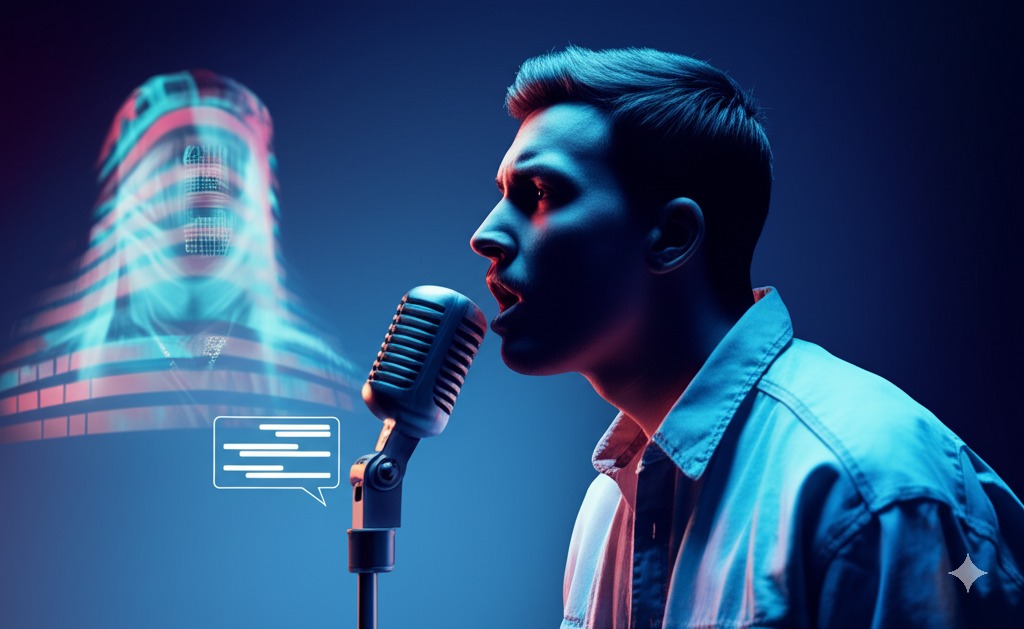
Viral Sensation: AI Voice Cloning in Pop
Voice Cloning Hits and Controversies
One of the most talked-about aspects of AI in pop music is voice cloning:
- In 2023, Ghostwriter997 released “Heart On My Sleeve” using AI-cloned vocals of Drake and The Weeknd
- The track generated over 8 million TikTok views before copyright takedowns
- This case highlighted both the technical capabilities and ethical problems of vocal synthesis
- It raised serious questions about artist rights and consent
Source: iMusician
Similarly, both authorized and unauthorized uses of voice cloning technology have made headlines:
- Grimes created an AI voice model that fans can license to make new tracks
- She offers a 50% royalty split on songs using her vocal timbre
- Meanwhile, unauthorized Taylor Swift deepfakes reached 500 million streams in 2024 before being removed
- These cases show the fine line between innovation and exploitation
Ethical Questions About AI-Generated Music
The Big Debates
As AI in pop music becomes more prevalent, several ethical questions arise:
- Who owns music created with AI assistance?
- Should AI-generated songs disclose their non-human elements?
- How do we protect artists’ voices and styles from unauthorized copying?
- Will AI homogenize pop music by optimizing for what algorithms see as “hit potential”?
The ethical implications of AI-generated music in pop are still being worked out, with no clear consensus yet from artists, labels, or listeners.
Finding the Balance
The industry is working to establish norms around AI music production:
- Some artists explicitly credit AI tools they use
- Platforms are developing detection systems for unauthorized voice clones
- Industry groups are drafting guidelines for ethical AI use
- Legislation is starting to address ownership and rights issues
Most experts agree that transparency is key – listeners should know when they’re hearing significant AI contributions, just as they would expect to know if a song uses samples from other tracks.
The Future of AI in Pop Music
What’s Coming Next
The next wave of AI in pop music technology promises even more capabilities:
- Real-time collaborative AI that can jam with human musicians
- Emotion-responsive systems that adapt music to listeners’ moods
- Virtual artists with complete AI-generated identities and catalogs
- Cross-media AI that creates matching visuals and music simultaneously
These advances could reshape not just how music is made, but what music is and how we experience it.
New Pop Genres on the Horizon
AI in mainstream music is likely to spawn entirely new subgenres:
- Human-AI collaborative styles that highlight the partnership
- Hyper-personalized music that adapts to individual listeners
- Algorithm-challenging music that deliberately subverts AI patterns
- Meta-pop that comments on its own AI-influenced creation
The evolution of AI across different music genres is gaining momentum, with these innovative techniques being adopted by artists in various styles.
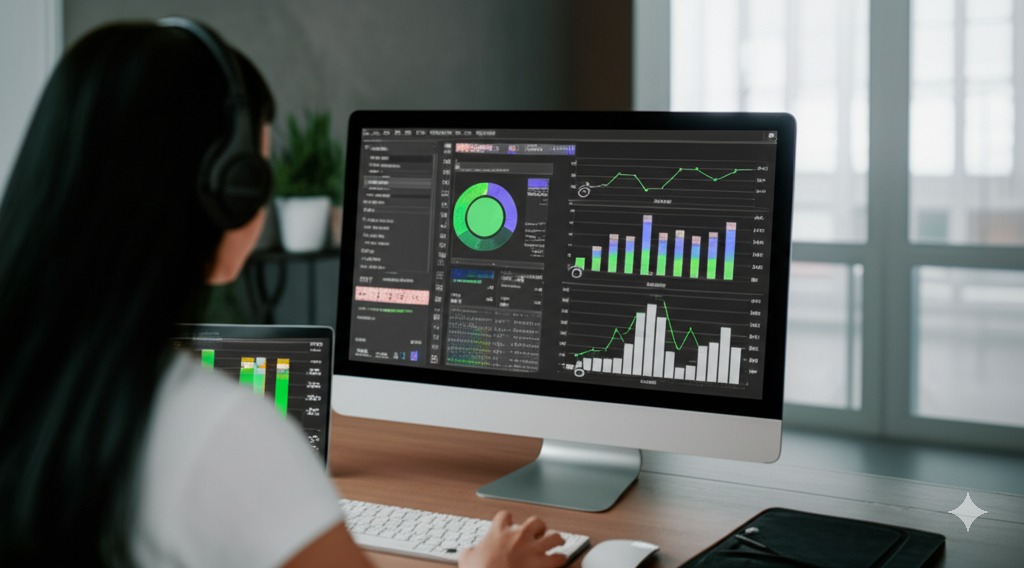
Questions People Ask About AI in Pop Music
Can AI replace pop songwriters?
While AI can write parts of songs, successful hits still benefit from human curation. For example, ChatGPT wrote about 60% of the lyrics for songs on Dua Lipa’s “Radical Optimism” album, but these were edited and refined by human producers including Tame Impala’s Kevin Parker. The most effective approach seems to be human-AI collaboration rather than replacement.
How is AI changing the sound of today’s pop music?
AI in pop music is influencing sound in several ways:
- More genre-blending as AI can easily mix different musical styles
- Higher production quality across the board, even for indie artists
- More rapid evolution of trends as production cycles shorten
- Some critics note increasing similarity among chart hits as AI learns from the same data
Is AI-created music less authentic?
This depends on how you define authenticity. If authenticity means human emotion and intent, then how AI is changing pop music production doesn’t necessarily reduce authenticity – it’s still humans directing the creative process and making key decisions about what emotions to convey. AI is just another tool, like Auto-Tune or sampling, that artists can use to express themselves.
How can new artists use AI to break into pop music?
New artists can leverage AI tools for songwriting and music composition to:
- Create professional-sounding productions on limited budgets
- Test multiple musical directions quickly
- Focus on their unique vocal style or message while AI handles technical aspects
- Use AI marketing tools to find their audience more efficiently
Many AI music creation tools offer free or affordable tiers specifically designed for emerging artists.
Final Thoughts on AI in Pop Music
AI in pop music represents a fundamental shift in how mainstream music gets made. It’s breaking down barriers between amateur and professional, speeding up production, and enabling new creative possibilities we’re just beginning to explore.
The most successful artists won’t be those who resist or fully embrace AI, but those who find the sweet spot where technology enhances their unique human creativity. The role of AI in creating mainstream pop hits will likely grow, but the human element – emotion, cultural context, lived experience – remains irreplaceable.
As listeners, we’re entering an era where the songs on our playlists might have increasingly complex origins – part human, part machine, all creative. The real question isn’t whether AI in pop music belongs, but how we’ll use it to push musical boundaries while preserving what makes music meaningful to us as humans.
